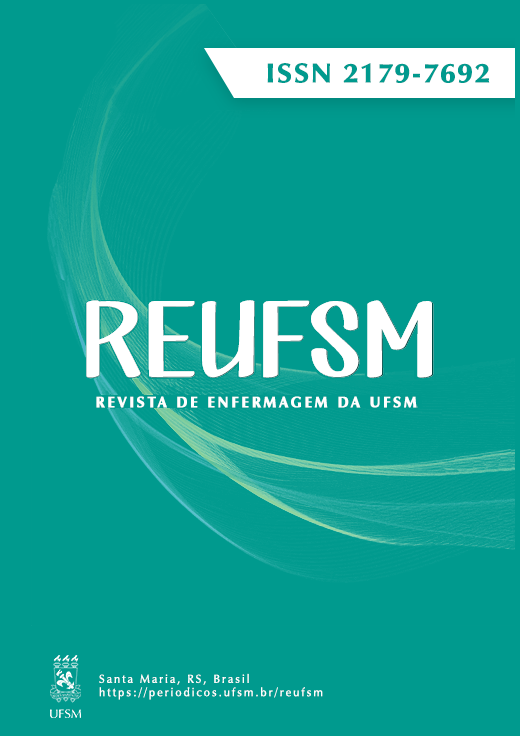Mothers of premature children and their social networks in pandemic times: A qualitative study
DOI:
https://doi.org/10.5902/2179769287289Keywords:
Social Networking, Infant, Premature, Maternal and Child Health, Nursing, Qualitative ResearchAbstract
Objective: to identify the relationship between mothers of premature babies and their social networks in caring for these children during the pandemic. Method: this is a qualitative study conducted with 12 mothers of premature babies followed by a high-risk maternal and child outpatient clinic in the interior of São Paulo, Brazil. Data were collected through semi-structured interviews and the creation of social network maps, which were analyzed using reflective thematic analysis. Results: the maps showed reduced and weakened social networks, with the family being the main source of meaningful bonds. Two final themes were identified, entitled “Challenges of adaptations in a fragile social support context” and “Restrictions on social relationships in facing COVID-19”. Conclusion: it is important that healthcare for premature babies and their families include attention to the social support of caregivers, with efforts to implement intersectoral and territorial and community-based care.
Downloads
References
Chawanpaiboon S, Vogel JP, Moller AB, Lumbiganon P, Petzold M, Hogan D, et al. Global, regional, and national estimates of levels of preterm birth in 2014: a systematic review and modelling analysis. Lancet Glob Health. 2019;7(1):e37-46. doi: 10.1016/S2214-109X(18)30451-0. DOI: https://doi.org/10.1016/S2214-109X(18)30451-0
Alberton M, Rosa VM, Iser BPM. Prevalence and temporal trend of prematurity in Brazil before and during the COVID-19 pandemic: a historical time series analysis, 2011-2021. Epidemiol Serv Saúde. 2023;32(2):e2022603. doi: 10.1590/S2237-96222023000200005. DOI: https://doi.org/10.1590/s2237-96222023000200005
Gonzaga ICA, Santos SLD, Silva ARV, Campelo V. Atenção pré-natal e fatores de risco associados à prematuridade e baixo peso ao nascer em capital do nordeste brasileiro. Ciênc Saúde Coletiva. 2016;21(6):1965-74. doi: 10.1590/1413-81232015216.06162015. DOI: https://doi.org/10.1590/1413-81232015216.06162015
Silva RMM, Pancieri L, Zilly A, Spohr FA, Fonseca LMM, Mello DF. Follow-up care for premature children: the repercussions of the COVID-19 pandemic. Rev Latinoam Enferm. 2021;29:e3414. doi: 10.1590/1518-8345.4759.3414. DOI: https://doi.org/10.1590/1518-8345.4759.3414
Maleki M, Mardani A, Harding C, Basirinezhad MH, Vaismoradi M. Nurses’ strategies to provide emotional and practical support to the mothers of preterm infants in the neonatal intensive care unit: a systematic review and meta-analysis. Women’s Health (Lond). 2022;18:17455057221104674. doi: 10.1177/17455057221104674. DOI: https://doi.org/10.1177/17455057221104674
Pinheiro SRCS, Gubert FA, Martins MC, Beserra EP, Gomes CC, Feitosa MR. Self-efficacy and social support of mothers of preterms in neonatal unit. Rev Bras Saúde Mater Infant. 2023;23:e20210289. doi: 10.1590/1806-9304202300000289-en. DOI: https://doi.org/10.1590/1806-9304202300000289-en
Franck LS, Waddington C, O'Brien K. Family integrated care for preterm infants. Crit Care Nurs Clin North Am. 2020 Jun;32(2):149-65. doi: 10.1016/j.cnc.2020.01.001. DOI: https://doi.org/10.1016/j.cnc.2020.01.001
Petruccelli G, Oliveira AIB, Ruiz MT, Wernet M. Maternal home care for premature and/or low birth weight children born during the pandemic. Res Soc Dev. 2022 Nov 15;11(15):e233111537281. doi: 10.33448/rsd-v11i15.37281. DOI: https://doi.org/10.33448/rsd-v11i15.37281
Reichert APS, Guedes ATA, Soares AR, Brito PKH, Bezerra ICS, Silva LCL, et al. Repercussões da pandemia da Covid-19 no cuidado de lactentes nascidos prematuros. Esc Anna Nery. 2022;26:e20210179. doi: 10.1590/2177-9465-EAN-2021-0179. DOI: https://doi.org/10.1590/2177-9465-ean-2021-0179
Sluzki CE. A rede social na prática sistêmica: alternativas terapêuticas. São Paulo: Casa do Psicólogo; 1997.
Weyers S, Rigó M. Child health and development in the course of the COVID-19 pandemic: are there social inequalities? Eur J Pediatr. 2023 Mar;182(3):1173-81. doi: 10.1007/s00431-022-04799-9. DOI: https://doi.org/10.1007/s00431-022-04799-9
Minayo MCS. O desafio do conhecimento: pesquisa qualitativa em saúde. 13ª ed. São Paulo: Hucitec; 2014.
Hennink MM, Kaiser BN, Marconi VC. Code saturation versus meaning saturation: how many interviews are enough? Qual Health Res. 2017;27(4):591-608. doi: 10.1177/1049732316665344. DOI: https://doi.org/10.1177/1049732316665344
Souza VRS, Marziale MHP, Silva GTR, Nascimento PL. Translation and validation into Brazilian Portuguese and assessment of the COREQ checklist. Acta Paul Enferm. 2021;34:eAPE02631. doi: 10.37689/acta-ape/2021AO02631. DOI: https://doi.org/10.37689/acta-ape/2021AO02631
Braun V, Clarke V. Reflecting on reflexive thematic analysis. Qual Res Sport Exerc Health. 2019;11(4):589-97. doi: 10.1080/2159676X.2019.1628806. DOI: https://doi.org/10.1080/2159676X.2019.1628806
Alves AB, Pereira TRC, Aveiro MC, Cockell FF. Functioning and support networks during postpartum. Rev Bras Saúde Mat Infantil. 2022;22(3):667-73. doi: 10.1590/1806-9304202200030013. DOI: https://doi.org/10.1590/1806-9304202200030013
Miranda LL, Ferrari RAP, Assunção RC, Zani AV. Paternal living of premature son hospitalized through photographic record. Esc Anna Nery. 2021;25(4):e20200314. doi: 10.1590/2177-9465-EAN-2020-0314. DOI: https://doi.org/10.1590/2177-9465-ean-2020-0314
Aubel J. Grandmothers - a neglected family resource for saving newborn lives. BMJ Glob Health. 2021 Feb;6(2):e003808. doi: 10.1136/bmjgh-2020-003808. DOI: https://doi.org/10.1136/bmjgh-2020-003808
Leahy-Warren P, Coleman C, Bradley R, Mulcahy H. The experiences of mothers with preterm infants within the first-year post discharge from NICU: social support, attachment and level of depressive symptoms. BMC Pregnancy Childbirth. 2020;20(1):260. doi: 10.1186/s12884-020-02956-2. DOI: https://doi.org/10.1186/s12884-020-02956-2
Carvalho NAR, Santos JDM, Sales IMM, Araújo AAC, Sousa AS, Morais FF, et al. Care transition of preterm infants: from maternity to home. Acta Paul Enferm. 2021;34:eAPE02503. doi: 10.37689/acta-ape/2021AR02503. DOI: https://doi.org/10.37689/acta-ape/2021AR02503
Lutkiewicz K. Social support, perceived stress, socio-demographic factors and relationship quality among polish mothers of prematurely born children. Int J Environ Res Public Health 2020;17(11):3876. doi: 10.3390/ijerph17113876. DOI: https://doi.org/10.3390/ijerph17113876
Patriksson K, Selin L. Parents and newborn "togetherness" after birth. Int J Qual Stud Health Well-being. 2022 Dec;17(1):2026281. doi: 10.1080/17482631.2022.2026281. DOI: https://doi.org/10.1080/17482631.2022.2026281
Sekhavatpour Z, Reyhani T, Heidarzade M, Moosavi SM, Mazlom SR, Dastoorpoor M, et al. The effect of spiritual self-care training on the quality of life of mothers of preterm infants: a randomized controlled trial. J Relig Health. 2020 Apr;59(2):714-24. doi: 10.1007/s10943-018-0620-4. DOI: https://doi.org/10.1007/s10943-018-0620-4
Cai Q, Wang H, Chen D, Xu W, Yang R, Xu X. Effect of family-centred care on parental mental health and parent-infant interactions for preterm infants: a systematic review protocol. BMJ Open. 2022;12(10):e062004. doi: 10.1136/bmjopen-2022-062004. DOI: https://doi.org/10.1136/bmjopen-2022-062004
Jantsch LB, Alves TF, Arrué AM, Toso BRGO, Neves ET. Health care network (dis)articulation in late and moderate prematurity. Rev Bras Enferm. 2021;74(5):e20200524. doi: 10.1590/0034-7167-2020-0524. DOI: https://doi.org/10.1590/0034-7167-2020-0524
Downloads
Published
How to Cite
Issue
Section
License
Copyright (c) 2024 Revista de Enfermagem da UFSM

This work is licensed under a Creative Commons Attribution 4.0 International License.
This work is licensed under a Creative Commons Attribution-NonCommercial-ShareAlike 4.0 International License.








